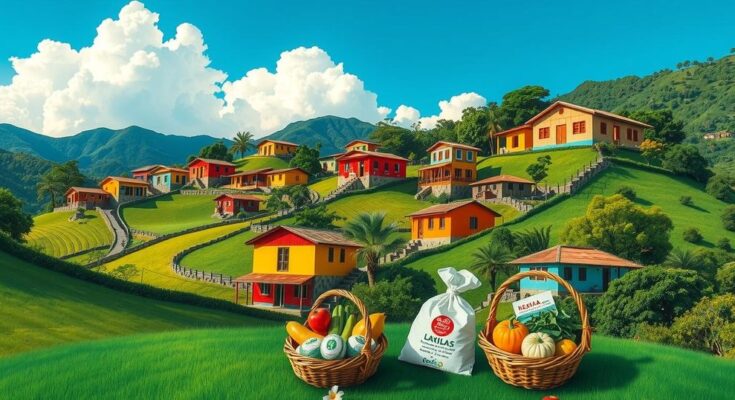The cuts to U.S. aid under Donald Trump have made Irish charity Trocaire’s contributions more critical in Guatemala, particularly for initiatives addressing climate change effects. With over 90% of USAID funding projected to be eliminated, local partners face increased pressures in disaster risk reduction and food security efforts. The indigenous Mayan community is especially affected, struggling with inadequate resources and advocating for land rights against exploitation by external corporations.
Donald Trump’s reduction of U.S. aid to regions affected by climate change, particularly Guatemala, has heightened the necessity of support from Irish charities, according to Trocaire. With more than 90 percent of USAID funding anticipated to be cut, the cuts threaten crucial projects aimed at disaster risk reduction and food security in a nation heavily reliant on American aid. The charity’s representatives express concern that local partners will face increased demand, as they begin to see the negative repercussions of diminished U.S. funding.
Trocaire’s country director, Martin Larrecochea, stated that the loss of support is likely to exacerbate existing challenges for the most vulnerable populations in Guatemala, especially amidst worsening climate conditions. As the U.S. pulls back on financial commitments, crucial humanitarian initiatives will suffer significantly, leaving a void that organizations such as Trocaire are being called to fill.
Policy adviser Chris O’Connell remarked that the funding cuts would drastically hinder humanitarian efforts across the sector, allowing wealthy and corrupt elites in Guatemala to benefit disproportionately from the situation. This redistribution of scarce resources is projected to impact a wide array of essential programs negatively.
In Guatemala, the indigenous Mayan community is already facing the harsh realities of climate change, with increased droughts and flooding disrupting their agriculture. In a small village of Qʼeqchi Mayans, families are grappling with failed crops, leading to economic hardships and concerns for future generations. Twelve-year-old Miriam Estela expressed her determination to pursue education, despite the escalating difficulties her family faces, highlighting a growing generational awareness of climate change implications.
Miriam’s father, Julio, shared his anxieties about the long-term effects of climate change on his children’s prospects, illustrating the broader struggles faced by many families in the region. Leonardo Cajbom, the village’s spiritual leader, reflected on the contrast between past struggles against violence and the current battle against environmental challenges, emphasizing the newfound opportunity for self-protection.
Efforts to mitigate the effects of climate change are underway within the community, including improved infrastructure and communications systems designed to enhance their resilience against severe weather. Experts like Dr. Conchita Reyes emphasize the disproportionate impact of climate change on impoverished communities, underscoring the need for collective action on this pressing issue. Trocaire continues to support these vulnerable populations, focusing on gender equality and land rights advocacy.
Moreover, Irish Aid’s contributions facilitate initiatives aimed at safeguarding Mayan lands from encroachment by corporations for agribusiness and mining ventures, as the community advocates against external exploitation of their resources. The sentiments among locals, as voiced by Gabriel Xi Pochan, reflect a fierce opposition to the unjust implications of U.S. corporate interests in their region, calling for a united stand against any further resource exploitation.
In light of the U.S. government’s significant cuts to foreign aid, support from Irish charities, particularly Trocaire, has become increasingly essential for maintaining vital humanitarian projects in Guatemala. This shift not only threatens the local population’s resilience against climate challenges but also underscores the complexities of existing social inequalities exacerbated by global funding dynamics. The ongoing efforts of Trocaire and local communities highlight the urgent need for protective initiatives, land rights, and equitable resource management to safeguard vulnerable populations against global climatic changes. Ultimately, collective action and sustained international support will play a crucial role in addressing the humanitarian crises exacerbated by reduced assistance from governmental bodies. The commitment of organizations and local communities alike reflects a unified front in the battle against both environmental degradation and socio-economic injustice.
Original Source: www.breakingnews.ie




